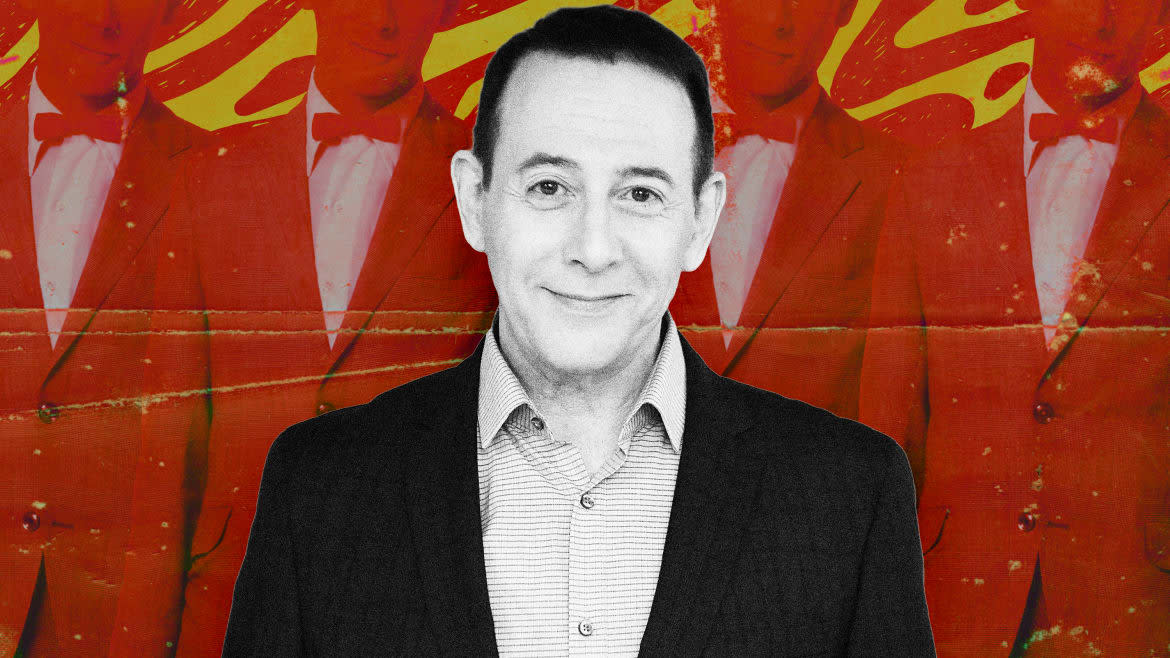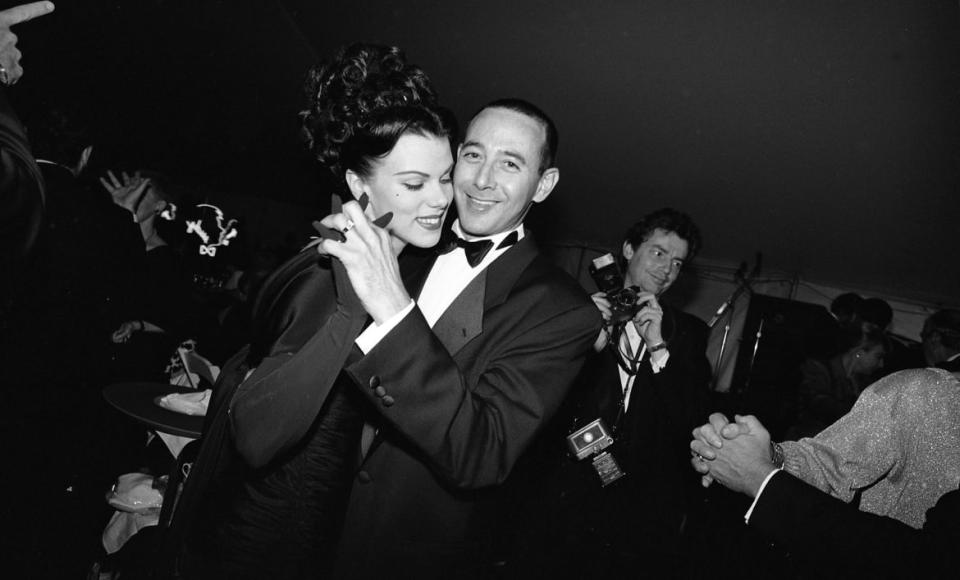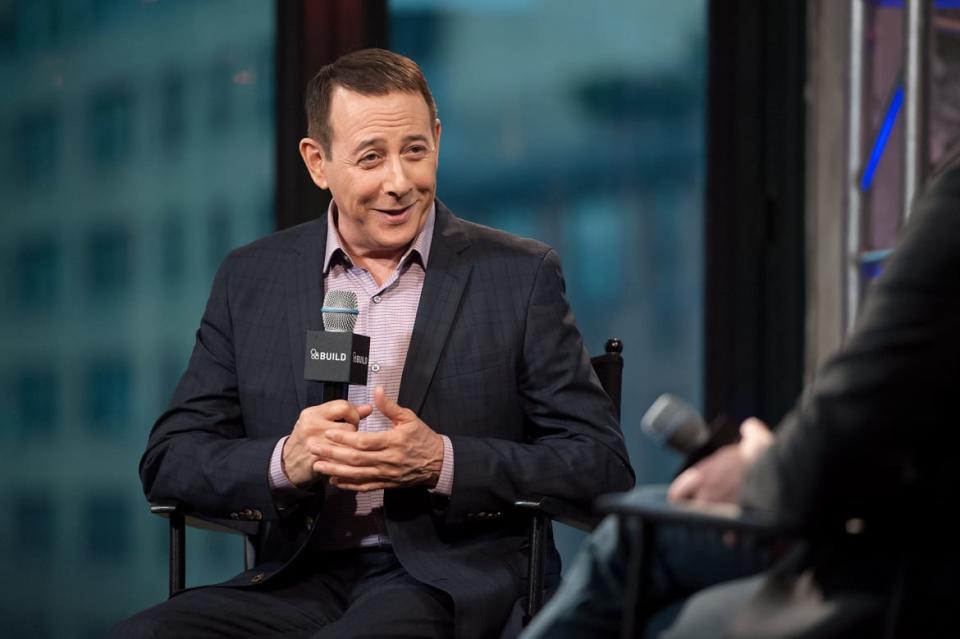Paul Reubens Never Got the Critical Reappraisal He Deserved

- Oops!Something went wrong.Please try again later.
- Oops!Something went wrong.Please try again later.
On Monday afternoon, the official Instagram account of writer and performer Paul Reubens released a statement that he’d passed away the previous day, the lamentable conclusion to a cancer diagnosis he’d kept private for six years. The tragic suddenness of his death at a still-too-young 70 was matched by the ardor of his many swift tributes, as fans and comedy luminaries alike waxed sentimental on all that the singular oddball best known for the hyperactive man-boy Pee-wee Herman meant to them. Anecdotes recalled his random acts of kindness, far past the scope of celebrity noblesse oblige to a steadfast, true magnanimity. Conan O’Brien and Scott Aukerman took to social media with heartfelt words reiterating that neither O’Brien’s various late-night stints nor Aukerman’s cult-beloved Comedy Bang! Bang! TV series could exist without the influence of Pee-wee’s Playhouse. Just about everyone he ever met fondly recalled Reubens’ diligent tracking of birthdays, which he always commemorated with a barrage of texted memes and vintage cartoon clips of cakes to the face. By all accounts, he never missed a Christmas card.
The horrible thing about death is how it always makes the resultant outpouring of affection for the deceased feel insufficient and tardy. For Reubens in particular, the homage paid to him comes with the sad sting of too little, too late. He’d kept himself occupied in the period prior to his illness with a steady-ish stream of lower-profile TV gigs, cameos, and voice work, some of it decidedly memorable, like the Hapsburg prince deformed from generations of inbreeding that he played in one episode of 30 Rock. But it was all a far cry from his ’80s heyday, when he appeared in cinemas, on magazine covers, and, while keeping character as Herman, on the Saturday Night Live stage that rejected Reubens’ own audition years earlier.
As a burnt-out Reubens prepared to turn out the Playhouse lights, his career arc was thrown off course by one arrest in 1991 and then permanently derailed by a second in 2002, both of which sullied the mainstream image of a wholesome children’s entertainer. Pee-wee Herman was never Mr. Rogers, however, and the narrative of his downfall isn’t so clear-cut either. Regrettably, if any significant revisions are to be made, they’ll now have to be posthumous.
Reubens and his star creation Pee-wee rose fast: a Groundlings stage show blossomed into an underground sensation, which got Warner Bros. on board with the 1986 silver-screen vehicle Pee-wee’s Big Adventure, directed by a young Tim Burton; this led to the launch of the Saturday morning classic Pee-wee’s Playhouse the following year. Comedy types were inspired by how this weirdo made the system work for him, commandeering corporate money to follow his bizarre, demented muses. (Please enjoy this Playhouse clip in which Reubens holds an uncomfortable close-up of a dog wetly eating food for 56 seconds on network television.) And they also admired how he actually pulled it off, inexplicably spinning his idiosyncratic, obscurity-mad love letter to kitsch into a massive hit at the center of the cultural radar. Parents sipping the morning’s first cup of coffee would plant their impressionable youngsters in front of Pee-wee, and while some appreciated the grown-up undercurrent of queer-tinged innuendo, others lacked the context to pick up that frequency.

And so when Reubens was handcuffed on charges of public indecency at Sarasota, Florida’s pornographic South Trail Cinema in 1991, his rangy-haired, rough-night mugshot became both punch line and scarlet letter. Disney-MGM edited Reubens out of their two-minute studio tour video, and Pee-wee dolls were pulled from shelves at Toys “R” Us. The right-wing media went frothy at its collective mouth, one of their most enduring fantasies—that the perfidious homosexuals are insinuating themselves amongst your children and bringing their unspeakable perversions with them—apparently validated. Reubens had his advocates, as made evident in a circumspect feature from the gay-friendly Entertainment Weekly, which placed its focus on the protesters picketing in support of their dear Pee-wee after CBS announced that it would pull Playhouse reruns. At the same time, a poll included in that piece found that nearly half of all respondents believed the network acted fairly, and that only 21-percent would identify themselves as “sympathetic” to Reubens.
Remembering Paul Reubens: ‘Pee-wee’s Playhouse’ Was the Best Kids’ TV Show Ever
While several of the fun new friends I made in the week after I published an article critical of QAnon-adjacent thriller Sound of Freedom still believe Reubens to be a spokesperson for covert pedophilia, the average person’s opinion occupies a slightly more enlightened vantage these days. Back in 1991, the Rolling Stone cover story “Who Killed Pee-wee?” hinted at the overzealousness of local law enforcement, before pivoting to place the blame on a vaguely defined “us.” (Most usefully, that report also gives a play-by-play of the Sarasota PD’s unorthodox raid process on that fateful day, in which the officers claim to have watched Reubens briefly pleasure himself, stop for the changeover between movies in the triple feature, resume masturbating, and then go to the bathroom, at which point they apprehended him.) Cut to the present, and an increasingly sex-positive culture is learning to recognize the basic harmlessness of gay men using a space conceived for communal sexuality as intended, as well as the reactionary motivations for police to intrude.
That stain on his reputation would color the view of Reubens’ 2002 arrest for child pornography, an underhanded shot at an easy target. Lumped in with Ferris Bueller’s Day Off actor Jeffrey Jones on his far more serious charge of soliciting a minor to pose, Reubens came under fire for a few photographs in a bulk purchase of decades-old kitsch erotica depicting models under eighteen. (The Los Angeles City Attorney rep who described the material as “kiddie porn” had never seen the photos in question.) The DA on the case found no cause to pursue a felony rap, and in 2004, the child pornography charge would be downgraded to misdemeanor obscenity. As lawmakers in conservative states argue that drag constitutes predatory grooming, the bad-faith agenda behind the repeated tarring of a public figure associated with the LGBTQ+ community for his private, outré tastes has only been rendered sourer and more transparent.

The past few years have been kind to wrongfully maligned tabloid favorites of the ’90s, due in large part to the efforts of the You’re Wrong About podcast to flip the script on such mockery objects as Anna Nicole Smith, Tonya Harding, and Lorena Bobbitt. Narrative media has hurried to catch up, extending emotionally charitable reappraisals to the likes of Pamela Anderson and Tammy Faye Messner. While an in-development documentary produced by the Safdie brothers may eventually give Reubens his due, he never got his turn while he was around to appreciate it. A Broadway show revived Pee-wee in 2010, and he got one more movie outing via Netflix in 2016, but neither had the cultural permeation of his earlier work. It would be easy enough to write this all off as garden-variety homophobia, or the reluctance to defend anyone accused of sexual impropriety for fear of proxy guilt by association, or even the simple fact that Pee-wee’s overgrown-kid schtick creeped a lot of (squaresville) people out.
Pee-wee Had One of Comedy’s Greatest Adventures
But Reubens never went on the defensive, making the media rounds with talking points about his innocence. He didn’t let an early precursor to cancellation send him on the path to bitterness trod by so many afterward. It could’ve just been savvy PR management, but I suspect he withdrew from public life for months after the ’91 arrest for much the same reason that he kept the past six years of cancer to himself. A man so singly dedicated to spreading joy couldn’t bear the thought that he’d leave anyone feeling bad.
Get the Daily Beast's biggest scoops and scandals delivered right to your inbox. Sign up now.
Stay informed and gain unlimited access to the Daily Beast's unmatched reporting. Subscribe now.

